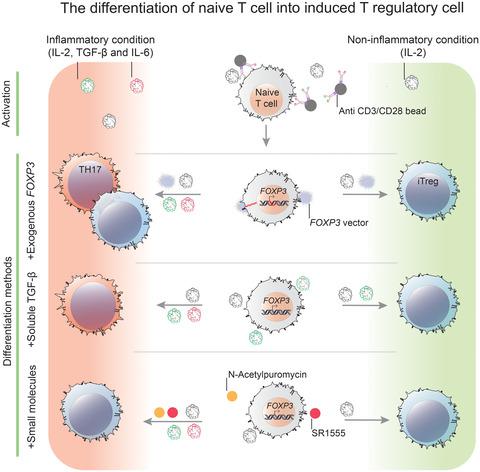当前位置:
X-MOL 学术
›
Clin. Exp. Immunol.
›
论文详情
Our official English website, www.x-mol.net, welcomes your feedback! (Note: you will need to create a separate account there.)
Directed differentiation of regulatory T cells from naive T cells and prevention of their inflammation-mediated instability using small molecules.
Clinical & Experimental Immunology ( IF 4.6 ) Pub Date : 2020-05-13 , DOI: 10.1111/cei.13453 M-H Haddadi 1, 2 , B Negahdari 1 , E Hajizadeh-Saffar 3 , M Khosravi-Maharlooei 4 , M Basiri 5 , H Dabiri 3 , H Baharvand 5, 6
Clinical & Experimental Immunology ( IF 4.6 ) Pub Date : 2020-05-13 , DOI: 10.1111/cei.13453 M-H Haddadi 1, 2 , B Negahdari 1 , E Hajizadeh-Saffar 3 , M Khosravi-Maharlooei 4 , M Basiri 5 , H Dabiri 3 , H Baharvand 5, 6
Affiliation

|
Regulatory T (Treg) cell therapy is a promising approach for immune tolerance induction in autoimmunity conditions and cell/organ transplantations. Insufficient isolation yields and impurity during downstream processes and Treg instability after adoptive transfer in inflammatory conditions are major limitations to Treg therapy, and indicate the importance of seeking a valid, reliable method for de‐novo generation of Tregs. In this research, we evaluated Treg‐like cells obtained from different Treg differentiation protocols in terms of their yield, purity and activity. Differentiation was performed on naive CD4+ cells and a naive CD4+/Treg co‐culture by using three different protocols – ectopic expression of forkhead box protein P3 (E‐FoxP3), soluble transforming growth factor β (S‐TGF) and small molecules [N‐acetyl puromycin and SR1555 (N‐Ac/SR)]. The results showed that a high yield of a homogeneous population of Treg‐like cells could be achieved by the N‐Ac/SR method under a T helper type 17 (Th17)‐polarizing condition, particularly interleukin (IL)‐6 and TGF‐β, when compared with the E‐FoxP3 and S‐TGF methods. Surprisingly, SR completely inhibited the differentiation of IL‐17‐producing cells and facilitated Treg generation in the inflammatory condition and had highly suppressive activity against T cell proliferation without Treg‐specific demethylase region (TSDR) demethylation. For the first time, to our knowledge, we report the generation of efficient, pure Treg‐like cells by using small molecules during in‐vitro inflammatory conditions. Our results suggested that the N‐Ac/SR method has several advantages for Treg generation when compared with the other methods, including a higher purity of Tregs, easier procedure, superior suppressive activity during the inflammatory condition and decreased cost.
中文翻译:

使用小分子从初始 T 细胞中定向分化调节性 T 细胞并防止其炎症介导的不稳定性。
调节性 T (T reg ) 细胞疗法是一种在自身免疫病和细胞/器官移植中诱导免疫耐受的有前途的方法。期间下游工艺和T不足隔离产量和杂质REG在炎性病症过继转移后的不稳定性是至T主要限制REG疗法,并指示在寻找一有效的,可靠的方法的重要性从头生成的T个REG。在本研究中,我们评估了从不同 T reg分化方案中获得的T reg样细胞的产量、纯度和活性。分化是在幼稚的 CD4 + 上进行的细胞和幼稚CD4 + / T REG共培养通过使用三个不同的协议-叉头框蛋白P3(E-的FoxP3)可溶性转化生长因子β(S-TGF)和小分子[N-乙酰嘌呤霉素和异位表达SR1555 (N-Ac/SR)]。结果表明,在 T 辅助型 17 (Th17) 极化条件下,特别是白细胞介素 (IL)-6 和 TGF,通过 N-Ac/SR 方法可以获得高产的 T reg样细胞群-β,与 E-FoxP3 和 S-TGF 方法相比。令人惊讶的是,SR 完全抑制了产生 IL-17 的细胞的分化并促进了炎症条件下的T reg生成,并且在没有 T 的情况下对 T 细胞增殖具有高度抑制活性。reg特异性去甲基化酶区 (TSDR) 去甲基化。据我们所知,我们首次报道了在体外炎症条件下通过使用小分子产生高效、纯Treg样细胞。我们的结果表明,与其他方法相比,N-Ac/SR 方法在 T reg生成方面具有几个优势,包括更高的 T regs纯度、更容易的操作、在炎症条件下具有优异的抑制活性和降低成本。
更新日期:2020-07-17
中文翻译:

使用小分子从初始 T 细胞中定向分化调节性 T 细胞并防止其炎症介导的不稳定性。
调节性 T (T reg ) 细胞疗法是一种在自身免疫病和细胞/器官移植中诱导免疫耐受的有前途的方法。期间下游工艺和T不足隔离产量和杂质REG在炎性病症过继转移后的不稳定性是至T主要限制REG疗法,并指示在寻找一有效的,可靠的方法的重要性从头生成的T个REG。在本研究中,我们评估了从不同 T reg分化方案中获得的T reg样细胞的产量、纯度和活性。分化是在幼稚的 CD4 + 上进行的细胞和幼稚CD4 + / T REG共培养通过使用三个不同的协议-叉头框蛋白P3(E-的FoxP3)可溶性转化生长因子β(S-TGF)和小分子[N-乙酰嘌呤霉素和异位表达SR1555 (N-Ac/SR)]。结果表明,在 T 辅助型 17 (Th17) 极化条件下,特别是白细胞介素 (IL)-6 和 TGF,通过 N-Ac/SR 方法可以获得高产的 T reg样细胞群-β,与 E-FoxP3 和 S-TGF 方法相比。令人惊讶的是,SR 完全抑制了产生 IL-17 的细胞的分化并促进了炎症条件下的T reg生成,并且在没有 T 的情况下对 T 细胞增殖具有高度抑制活性。reg特异性去甲基化酶区 (TSDR) 去甲基化。据我们所知,我们首次报道了在体外炎症条件下通过使用小分子产生高效、纯Treg样细胞。我们的结果表明,与其他方法相比,N-Ac/SR 方法在 T reg生成方面具有几个优势,包括更高的 T regs纯度、更容易的操作、在炎症条件下具有优异的抑制活性和降低成本。


























 京公网安备 11010802027423号
京公网安备 11010802027423号